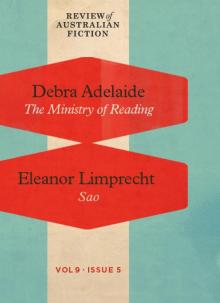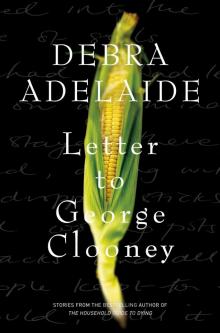- Home
- Debra Adelaide
Zebra Page 3
Zebra Read online
Page 3
We landed just before dawn and by the time I exited the terminal, light was seeping through the indigo sky. I had forgotten about the desert chill. I stopped and took a jacket out of my backpack, knowing that in another hour or so I’d be taking it off again.
You couldn’t fly all the way to that country, of course. We had flown west for hours, but the place where I was heading was now east. To get to it we’d had to fly all the way over it, to the closest town to the border. Now I would have to wait for a supply truck, one authorised to take travellers, as there were no longer any coaches and private cars had long been banned. When one came along, seeming barely to pause to let me in, I realised we would be driving for hours with the rising sun in my eyes. Leaving in haste, at night, I had not thought to bring sunglasses. I threw my backpack and the guitar in the rear seat and climbed on board.
The truck driver did not speak, though he was not unfriendly. He clearly preferred his own company and the sound of whatever he was listening to through earpieces that attached to a player on the dashboard. I closed my eyes and tried to rest as we sped through the morning. We drove for hours in the unbroken silence, the road unexpectedly straight and hard and fast, though, when I thought about it, I supposed it needed to be. Now that the conflict had accelerated, troops would have to be able to get quickly from place to place.
‘Checkpoint ahead,’ the driver finally said, dislodging me from a near sleep.
By now the light was bright. I squinted and saw ahead the long glittering line that stretched as straight as the road we were on, seeming to cross it. But the road stopped at the checkpoint. The driver waved me out with him, spoke briefly to the security officer at the gate, and returned, tucking his ID card back into his wallet. I wondered if he needed a passport to get through. I wondered about the load he was carrying, what goods were now being allowed through, and why. I barely had time to get my things out of the back before he accelerated and drove through. The gates closed behind him and I stood in the road with the sun falling down like a blessing I did not need.
This was the infamous fence. Three sides of a square at the bottom of the autonomous state now just called Country, stretching to the ocean way up north. Forming a country within the country, as it now was. The cyclone wire fence so straight and neat: if it were a perforated map you could just tear this bit off and toss it away. There had been dingo fences and rabbit-proof fences before – now we had the ultimate fence. A see-through Berlin wall, containing all the people who refused to submit or conform, swept up out of every corner of the country and installed here, forever. Told they could live wherever they wanted in Country, do what they liked: hunt, sleep, fight, sing, make love and music wherever they liked, but they could never come back.
And at the start they literally did not get a thing more: not a ration of bacon, not a sack of flour, not a packet of Band-Aids or a single headache pill. You wanted your lands, you got them back, the government decided. You want your sovereignty, so take it. You wanted country, you now got country, they said. Welcome to Country, said signs posted at all the entry checkpoints along the fence, a message for every new load of people rounded up and brought in.
Except here, at the most accessible side, there was a war, with supplies drip-fed or smuggled through by sympathetic people outside Country. The entire coast, of course, was the weakness, despite fences on every landing point and razor wire on all the beaches. Charities or just charitable people regularly threw supplies over the fence all the way around. No one could ever stop that. And they had never been able to stop the music coming out over the airwaves, despite cutting off the electricity years ago, right at the start.
That community I’d heard singing on the program, that person asking for help, was located around this side of Country. It was probable that if I waited long enough or walked along enough of the fence near one of the checkpoints I would encounter someone on the other side. It happened all the time. People stationed to receive or pass on news and telegraph it back via smoke signals, runners, even just by coo-eeing across the desert lands.
I didn’t have a hat, I didn’t have anything much, but I had a bottle of water and there was a clump of mulgas, enough shade if I sat patiently. The security officers at the checkpoint, just a donga with an air-conditioning unit almost as big, stared indifferently through me. I wondered, if I was desperate for water or anything, would they help?
Luckily I didn’t have to find out. In the early afternoon some figures appeared through the shimmering heat. I walked right up to the fence.
‘You heard,’ a woman said. ‘You came all this way.’ She had a couple of kids with her, teenagers.
I nodded and tossed the guitar as high as I could. For a moment I thought it was going to catch on the razor wire, but it only brushed the top of the fence, then wobbled, then fell down straight into her outstretched arms.
I knew not to wait for or expect thanks, so I turned to leave, then stopped, fished the packet of cigarettes out of my backpack and tossed them over too. One of the kids stretched out a hand and caught it like a pro. I hoisted my backpack again and was already walking away when she called out.
‘Hey!’
I turned around.
‘My boys will love this.’ She was holding the guitar horizontally, in two hands, as if it were an offering.
‘Good,’ I said. ‘My boy did. My son loved it too.’
A Fine Day
April, and already it felt like winter. I sat in the lounge room trembling. But Alex made no offer to turn the heater on, so I joined him at the kitchen door. Tried to resist his anxiety. He darted around, balancing plates and saucepan lids on sweaty hands. Thrust a fork into the steamy interior of a pot. I sipped my wine. This was always Alex’s culinary style: endless prodding, the heat too high, the vegetables cooked way in advance of the meat. And talking. Lecturing, with tongs aloft, waving them in the air to make his points. Which were beyond me, faced with the prospect of burning poultry. The sacrilege of overcooked snow peas.
My eyes browsed over the rim of my glass. All the cupboard doors were flung wide. The cutlery drawer like an imbecile’s jaw. The tap dribbling over congealed fat. Alex now employed a boning knife to slice the bread, then prise the lid off a tin. He fancied himself as the gourmet chef. I couldn’t interfere, stood in the doorway instead sipping cask wine. Who’d have thought it. Cask wine this close to the 2020s.
‘I don’t think it needs salt?’ He picked the shaker up but was looking for agreement, not dissent. I liked a lot of salt, but Alex had added health consciousness to his obsessions. He wasn’t even paying attention to the meal, being far too preoccupied with work. He would never leave the public service, as much as he complained. Not so long as he could still complain about A, B or Z and find himself superior to them.
‘What’s Julia’s husband like?’ I mainly wanted to distract him from adding vinegar to a stir-fry that already looked acidic.
A pause. Alex transferred tongs from right to left hand. Poked his spectacles up his nose, placed the free hand on his hip.
‘I like Evan.’
Could three words contain so much! But that was Alex: should have been an actor. Gesture, tone, timing – all impeccable. Three words which said: You know, Evan is difficult, a bit of a prick, really, but I am the only person sensitive and perspicacious enough to see the good points of this man, to see past the superficial irritations to value his character, whereas everyone else dislikes him or misunderstands him. Including his wife. Evan is not without his drawbacks, but I am prepared to forgive them while many others cannot.
I like Evan. I wanted to grab the tea towel dangling from his back pocket and whip him across the face. Sometimes I couldn’t believe we were still friends.
‘Anyway, they’ve split up.’
‘Really?’
Julia. All the way back to our undergraduate years. I would have been closer to Julia if I’d remained in Ca
nberra. I’d not even got to meet Julia’s new husband and now the guy was history. It wasn’t hard to make the necessary mental adjustment and delete Evan and return to thinking of Julia as single, but this wasn’t the first time her name had come up in the conversation that night. Typical of Alex’s little mental games. If I hadn’t asked, he would have said nothing then later accused me of not knowing and therefore not caring. And succeeded in making me feel guilty for it. I was convinced we were still friends only because I left Canberra.
More pirouetting and poking, made even more ridiculous by Alex’s general pudginess and short-armed movements. Finally he pronounced the chicken ready. He dished it out anxiously, peering over his spectacles, asking how much, was that enough rice, what about the peas, could I handle a few more, was I sure I didn’t want the leg, until I could have jabbed him with my fork. What was I doing here, eating an indifferent meal in a cold house in a bleak satellite suburb of a city I no longer cared for? Was our friendship even still alive? This meal was like its wake.
After the first mouthful Alex leaped. ‘Is it all right?’
The chicken was dry. The sauce somehow managed to taste both underdeveloped and burnt. The snow peas were khaki and flaccid.
‘Good, mate. Lovely.’
I ate, not talking. Alex ate and talked. He dined in the American manner, transferring his fork to his right hand after cutting his food, making the meal more leisurely than it deserved, prolonging the whole sorry ordeal. I scooped up the plates as soon as possible and began the washing-up. Not only for this meal, and a spectacular number of dirtied utensils and dishes at that, but as many from the cupboards as I could discreetly manage. Especially anything I’d likely be using during my stay. Everything was covered in a film of grease. Not that Alex didn’t clean or wash up, but I’d seen him at the sink often. It was an incitement to murder. He’d throw in everything unrinsed, from wine glasses to cast-iron frypans, fill the sink with water, add a squirt of no-frills detergent, then jiggle things around with a finger while pouring another glass of wine. Even with spectacles Alex’s eyes were weak, but too often I’d watched him fish items out, shake off the lardy bubbles, then stack them in the drainer, smeared and cloudy. I know I have a thing about dishwashing, a generally un-blokey, Zen kind of approach that savours the ritual. But Alex was far worse than anyone.
I Ajaxed the sink first. Hands sunk in the water, I tackled four worries, while in the next room Alex tinkered with his sound system. First, how much longer could I stay here, with someone constantly seeking approval for every domestic achievement? So far Alex had demanded admiration of: his Ikea bookshelves, a new shower curtain, and the pots of herbs on the back porch. I’d been here two hours and was already thinking of home.
Second, the problem of a departed wife. The main reason I had, between work commitments, agreed to come down for a few days. Not dearly departed, but she may as well have died and gone to the afterlife, the way Alex had been talking. And since I’d arrived he’d barely stopped talking about her and I didn’t want to stay with Helen too. Or Alex’s version of her. That meal, chicken and stir-fry – it was her dish, I knew, something she cooked all the time. Alex was only pretending.
Third . . .
‘Do you want to listen to the news? Or that new Sigur Rós album? I could Spotify it.’
I really wanted to telephone Riley (he would be where?), get warm, preferably in a hot bath, then go to bed with a great book I’d begun the day before. Sigur Rós were from a cold country, weren’t they? I shivered.
‘News.’
‘Good. Then we can keep talking if it gets boring.’
Not good. Third, there were more reasons by the minute why I was finding Alex and his house so repellent after years of friendship. The perpetually soggy bathroom floor, the hard towels, the insulting Palmolive Gold soap – did his guests need extra help in the hygiene department? – the lack of real coffee, the brown-leafed African violet on the kitchen windowsill that had sat there as long as I could remember and had never once flowered. All the credit I’d unconsciously allocated this friendship seemed used up. Things previously tolerated were now placing it seriously in the red.
I shivered again. Four worries: it was so cold in Canberra.
Alex wanted me to help him persuade Helen to return. But what was I thinking of, even agreeing to visit? My own partner was, I suspected, starting to stray. Perhaps it was work, which he couldn’t discuss. Or perhaps it was something else. Only last week Riley had come home, disappeared again, returned, then gone off again after yet another late-night call. Alex had sounded so forlorn I agreed to go down and try to help him. I didn’t have any ready excuse not to.
‘It’s perfect weather here at the moment,’ he had lied. ‘Beautiful. The trees are metamorphosing.’ Alex would never use a normal word when there was a Latinate polysyllabic to hand. ‘And I’m not so busy at work. We could go to a play. Or the movies.’
‘I can’t, my car’s playing up,’ I had lied in return. ‘And Riley needs his.’
Then Alex had offered: ‘I’ll pay for your flight. You love plane trips.’
Now the price of that ticket was clear.
We sat in the frigid lounge room with the ABC on. Alex was perched on a velour pouffe. With his weight it looked like he was laying a large brown egg. Over the news reports, he commented and ranted and wobbled back and forth while I shivered and thought about escape to the spare room. Which would be even colder. I wanted to disappear and read The Sparsholt Affair, and Alex wanted Helen back, but as I thought longingly of Oxford in 1940 and he spoke passionately of Helen, I realised that he didn’t want her back – he only wanted to talk about having her back. I finally got the point: it was not that he was devoted to her; rather she filled his need to have a problem. Several problems. Alex had a series of unhappy obsessions and this was what made him happy. Work, Helen, workmates, women generally, the council harassing him over his front fence: they were all part of the banquet of conflict and warfare that was Alex’s entire life. He spread this out on the dining table of his personality years ago. When the odd morsel dropped on the carpet, like now, it was profoundly distressing.
No wonder I found him so irritating. No wonder Helen had left.
‘Actually, I thought we could go to Uncle Vanya.’ He killed the TV.
‘When, tonight?’ It was getting on for eight. ‘Have you got tickets?’
‘Oh, we could pick them up at the door. It’s only a small theatre company, at the uni.’
Even under benign conditions, the idea of Uncle Vanya failed to excite me. For some reason I had always found the northern European dramatists depressing, even their comedies. Especially their comedies. Uncle Vanya tonight in the cold was unimaginable. To sit in an unheated theatre with student actors trotting out lines about the enchanting weather and one’s unbounded happiness, or discussing the temperature of the samovar . . . Maybe in the original language it would sound better. But in Canberran Australian English, with the wind whipping down Northbourne Avenue sending gusty draughts into the theatre . . .
It was imaginable.
‘Then again, it’s running all week,’ Alex said.
So complete escape was not in the bag. Though there was a strong possibility it would be cancelled due to lack of interest. I felt a tiny pang of guilt. Alex had majored in drama studies. Once auditioned for NIDA. His public service job was punishingly uncreative.
‘I want you to find her.’
‘What?’ I was preoccupied with the thought of my lucky escape from the cynicism of Vomitski – no, Voitski – and long passionate speeches about the disappearing forests. Maybe the Russian would not sound that much brighter.
‘Talk to her. Ask her to come back.’ His gaze was earnest through his thick spectacles. And I hadn’t been listening properly.
‘You want me to get her back? Why me?’
‘She won’t talk to me. H
asn’t for months.’
‘But I hardly know her.’
I had met Helen three, four times. First time at the wedding. No, not wedding. Marriage. There was an occasion, true, and a certificate, but nothing approaching the white-dress, tiered-cake and keg-of-beer style of occasion. There was no ritual in their austere coupling in the park at the end of Alex’s street: a Colorbond fence surrounding a parched lawn featuring grevilleas clipped too severely for native birds to bother visiting. This was followed by dinner at a near-empty Chinese restaurant where Alex’s friends discovered we were all meeting Helen for the first time, though we knew that he kept the compartments of his life separate. We all pretended not to notice his parents bickering the entire night. To like the soggy dim sum entrée and tinned lychees for dessert. None of her family was present, County Cork being a long way off.
Now he wanted her back. The marital abode was too empty. He’d lived here long before they got together. I suspected that was part of the problem. But what about people who knew her better, closer friends, ones who lived here, people she worked with? Alex shook his head.
‘The fact you don’t know her well is so much better. She’ll resent anyone closer getting involved.’
‘I’m not sure about that.’
‘I’ll pay you.’
‘Don’t be a dick. I’m your friend.’ Just.
‘But you and Riley do this sort of thing? I’m happy to pay for a professional job.’
‘Riley is in security, not surveillance. And I just do the books.’ I’d explained this a million times. Was it the perennial dullness of public service life or did Alex believe there was more to Riley’s spontaneous trips? He seemed convinced there was something cloak and dagger-ish about our lifestyle. Riley knew as much about retrieving lost spouses as he did about particle theory. ‘We’ve never looked for a missing person before.’
‘Oh, Helen’s not missing.’
No wonder at times I wanted to kill him. ‘Then why do you want me to find her?’

 Zebra
Zebra Review of Australian Fiction, Volume 9, Issue 5
Review of Australian Fiction, Volume 9, Issue 5 The Women's Pages
The Women's Pages Letter to George Clooney
Letter to George Clooney